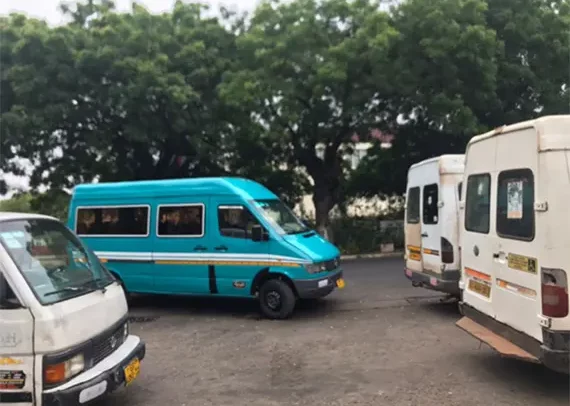Some commercial vehicles
The recent 15% reduction in transport fares after a drop in fuel prices and the appreciation of the cedi was expected to ease the financial burden on Ghanaians. This reduction took effect from May 24, 2025 and applied to shared taxis, intra-city transport (‘trotro’), intercity transport (long distance) and haulage. However, many commercial drivers in Accra have expressed frustration about how the reduction has reduced their daily income.
Atta, a trotro driver on the Osu to Abokobi road, said the government’s call to reduce fares has negatively impacted their earnings.
“There is even the introduction of the D-Levy, where we’re taxed for one cedi on every litre of fuel we purchase, also prices of spare parts haven’t been reduced. The fare reduction just made things worse,” he said in an angry tone. “The road to Abokobi is also bad. We spend more money maintaining our cars than before.”
According to Atta, the supposed fuel price relief the government promised has not been implemented to support drivers, as other operational costs remain high. “Our income level has fallen drastically,” he added.
Moro, a trotro mate, who has worked for 12 years, shared a similar view. “After paying for fuel, sales, and ticket, there’s nothing left. My wife doesn’t even believe me when I tell her how little I earn.”
Another driver said he could make ends meet under the previous government, but not anymore.
These drivers threatened that they might mobilise for a nationwide strike if the government doesn’t take measures to support them.
Mr. Kwaku Gyan, Secretary of Ghana Private Road Transport Union (GPRTU) Branch 2 at Osu, confirmed that many drivers were unhappy with the fare reduction directive.
While the Ashanti Regional Chairman of GPRTU, Alhaji Sumaila Boakye, in an interview on May 24, 2025 urged spare parts dealers and service providers to also reduce the cost of their goods and services – following GPRTU’s decision to reduce transport fares – there has not been any confirmed nationwide response to this call.
Although some vendors in Abossey Okai claimed they have reduced prices of spare parts slightly due to the cedi’s appreciation and easing imports costs, many drivers say they have not noticed any significant difference in the prices.
This lack of coordinated price drop has prompted commercial drivers to call on the government to intervene with policies that touch on vehicle maintenance costs, road conditions, and fair fare pricing.
As fuel prices rise again, drivers are not smiling at vehicle stations at all. For many of them, the government’s promise of economic fairness feels distant.
Now, the question is: who is really benefiting from Ghana’s public transport policies – the passengers, drivers, the spare parts dealers, GPRTU, or the government?
By Abdul Karim Adizatu (email: adizaabdulkarim204@gmail.com)


